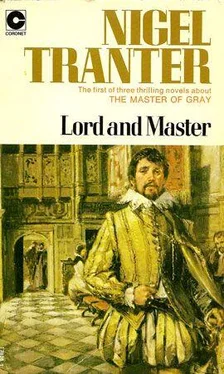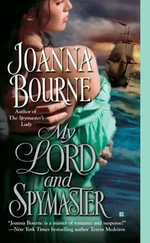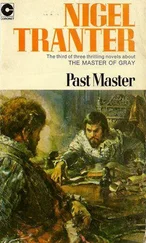Nigel Tranter - Lord and Master
Здесь есть возможность читать онлайн «Nigel Tranter - Lord and Master» весь текст электронной книги совершенно бесплатно (целиком полную версию без сокращений). В некоторых случаях можно слушать аудио, скачать через торрент в формате fb2 и присутствует краткое содержание. Жанр: Исторические приключения, на английском языке. Описание произведения, (предисловие) а так же отзывы посетителей доступны на портале библиотеки ЛибКат.
- Название:Lord and Master
- Автор:
- Жанр:
- Год:неизвестен
- ISBN:нет данных
- Рейтинг книги:4 / 5. Голосов: 1
-
Избранное:Добавить в избранное
- Отзывы:
-
Ваша оценка:
- 80
- 1
- 2
- 3
- 4
- 5
Lord and Master: краткое содержание, описание и аннотация
Предлагаем к чтению аннотацию, описание, краткое содержание или предисловие (зависит от того, что написал сам автор книги «Lord and Master»). Если вы не нашли необходимую информацию о книге — напишите в комментариях, мы постараемся отыскать её.
Lord and Master — читать онлайн бесплатно полную книгу (весь текст) целиком
Ниже представлен текст книги, разбитый по страницам. Система сохранения места последней прочитанной страницы, позволяет с удобством читать онлайн бесплатно книгу «Lord and Master», без необходимости каждый раз заново искать на чём Вы остановились. Поставьте закладку, и сможете в любой момент перейти на страницу, на которой закончили чтение.
Интервал:
Закладка:
Then David perceived Patrick and Logan, with the latter's men in a solid phalanx, boring their way into the melee, shouting 'A Logan! A Logan!' and scattering men like chaff on every side. David spurred to join them, his sheathed sword drawn. Scot and Englishman alike they beat aside lustily, and none might penetrate their tight spearhead formation. These were the experts.
This vigorous if belated intervention, added to the efforts of Foster and Kerr and Harden, turned the tide. Indeed, in a few hectic minutes it was all over. Angry men were pressed back to their own sides of the score in the turf that marked the actual Border-line, nursing their wounds, shaking their fists, and hurling bloody threats. But these were mere echoes; the storm was past
What had provoked it, nobody seemed to know for sure. There were half-a-dozen wrathful assertions. The Scots were unanimous that it was amongst their ranks that men had fallen first – shot by unheralded English arrows. Sir John Foster denied this, swearing that his friend, the Lord Russell, had been the first to fall, quite close to his side. And, sure enough, amongst the actually few slain lay the handsome son of the Earl ofBedfbrd, with an arrow projecting from between his shoulder-blades. David, had his opinion been asked, would have said that he had been shot from behind, whilst facing the north.
By mutual consent me meeting broke up without more ado, even though its business was by no means finished; the atmosphere was no longer conducive to negotiation and sweet reasonableness. Not that anyone took the disturbance seriously, for on the Borders violence was the rule rather than the exception. It was just unfortunate that amongst the casualities should have been an earl's son, all agreed.
Just how unfortunate that fact was, few however could have guessed.
David himself, two days later, copied out the letter to be sent to Elizabeth, signed by James, protesting in dignified terms at the proposed trial of the Queen of Scots, insisting upon the impossibility of a charge of treason being levelled against a crowned monarch, and indicating that unfortunately, whilst any suggestion of such a trial remained, the Scots Privy Council would most assuredly refuse to consider the ratification of the proposed Protestant alliance. David indeed actually adjusted some of the wording himself, to his brother's mild amusement, for the King's signature, and helped impressively to seal and despatch by urgent courier the precious document. He did not see, however, the private letter which Patrick sent by the same courier.
It was while they awaited an answer from Elizabeth, David at least with much anxiety, that a quite different storm burst upon the Scottish Court from the south, all unexpectedly – at all events, once again, to David Gray, as to others much more loftily-placed. It came in the form of a furious letter from Elizabeth, a second from the Lord Burleigh, and vehement supporting representations from the English ambassador on the instructions of Walsingham. Like an explosion it rocked Edinburgh.
The Queen of England was enraged. One of her most gallant and favoured subjects, the excellent Lord Russell, had been savagely and barbarously done to death, whilst on an official mission and on English soil, by the minions of the Earl of Arran. Arran had indeed been present at the dastardly outrage. Assuredly nothing of the sort could have occurred in the presence of the Scottish Chancellor without his approval and instigation. Arran was therefore the murderer of one of the Queen's most beloved friends. She demanded forthwith that he be handed over to her Governor of Berwick, to stand immediate trial for his crime.
To say that James was appalled by this extraordinary communication, is to put it mildly. The young King indeed took to his bed, and at first refused to see anyone, Arran included. For Burleigh's supporting letter left no doubts as to the seriousness with which the matter was viewed in London, though nobody in Scotland had ever heard of Lord Russell being prominent at the English Court Burleigh, repeating the Queen's charges, announced that should her demands anent the Earl of Arran not be met immediately, James's pension would cease, all diplomatic relations would be broken off, a punitive expedition would be despatched to the Border, and a Bill would be rushed through Parliament debarring James from any possibility of the succession to the English throne.
The King turned his face to the wall, and wept
Well might Arran fume and curse and plead, mystified as he was wrathful. James would not hear him. The younger man was struck in his most vulnerable spot-his overmastering ambition for the dual throne of England and Scotland. He would hear nobody indeed, shutting himself away, while his Court wondered and questioned and debated. Never had a storm arisen out of so small a cloud. Border incidents were an everyday occurrence, and many more prominent men than this Bedford heir had died in them. What did this mean? And what would be the outcome? It was inconceivable that the King could hand over his Lord Chancellor and favourite to an English trial…
Yet, when at last a puffy-eyed, nervous and stammering James was brought to the point of granting the audience that the English ambassador demanded, it was on this impossible condition that Wotton insisted. Arran and Kerr of Ferniehirst must be delivered up, he declared. His instructions were adamant. James gabbled and shrilled and choked. Wotton would not budge – and reiterated the consequences. The English Parliament had never been so anti-Scots, he pointed out, especially with the other matter of Mary Stuart's plot and the threat of assassination against Elizabeth. They would debar the Scots succession without any urging from the Queen; indeed, it would undoubtedly require Elizabeth's active intervention on his behalf to save his claim now.
James's tears overflowed again. He wailed that he would that all the lords of his Borders were dead and the fine Lord Russell alive again.
It was the Master of Gray who, presently, suggested a compromise. While it was unthinkable that my Lord of Arran should be handed over to the Governor of Berwick like some English renegade, it might be advisable and acceptable that His Grace should confine him in some assured stronghold where he could be held secure until this unfortunate business was suitably adjusted and resolved to the satisfaction of all parties…'Yes, yes,' James cried;, clutching at a straw. Assuredly, that was the solution. His good sister Elizabeth would surely be satisfied with that! Captain Jamie should be shut up, at once. Let it be seen to. In St. Andrews Castle for sure. It was the strongest Aye, right away. He would send a letter to Her Grace of England – a special envoy – explaining the matter. Ferniehirst should be punished, of course – hanged.
Wotton, professing serious doubts, withdrew on Patrick's pressing his arm.
And so, ridiculously, fantastically, for one of the few crimes that he had not committed, fell Captain James Stewart, Earl of Arran. Or commenced his fall; for his was a somewhat prolonged descent. He was immured in St Andrews Castle, deprived of his high offices, and James mourned for him as though dead – but not quite as he had mourned for Esme Stuart And the Master of Gray ruled in his stead – though modestly he refused the style and title of Lord High Chancellor. He did however preside over the meetings of the Privy Council, even though in a determinedly unofficial and temporary capacity. No jealous earls or lords might say that Patrick Gray thrust himself into the highest office under the Crown.
Elizabeth Tudor informed her Parliament that she could not countenance the public trial of her erring sister Mary Stuart -meantime. But an Act passed, naming as liable to summary execution not only all who plotted against her life but those in favour of whom the plots were made, would be a sensible and just precaution. The Act was passed with acclamation.
Читать дальшеИнтервал:
Закладка:
Похожие книги на «Lord and Master»
Представляем Вашему вниманию похожие книги на «Lord and Master» списком для выбора. Мы отобрали схожую по названию и смыслу литературу в надежде предоставить читателям больше вариантов отыскать новые, интересные, ещё непрочитанные произведения.
Обсуждение, отзывы о книге «Lord and Master» и просто собственные мнения читателей. Оставьте ваши комментарии, напишите, что Вы думаете о произведении, его смысле или главных героях. Укажите что конкретно понравилось, а что нет, и почему Вы так считаете.












